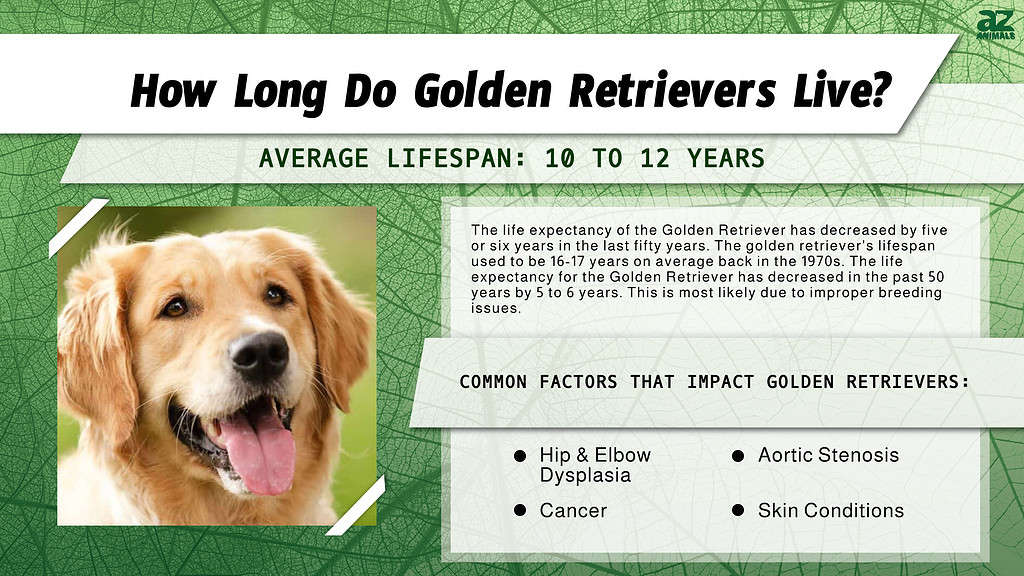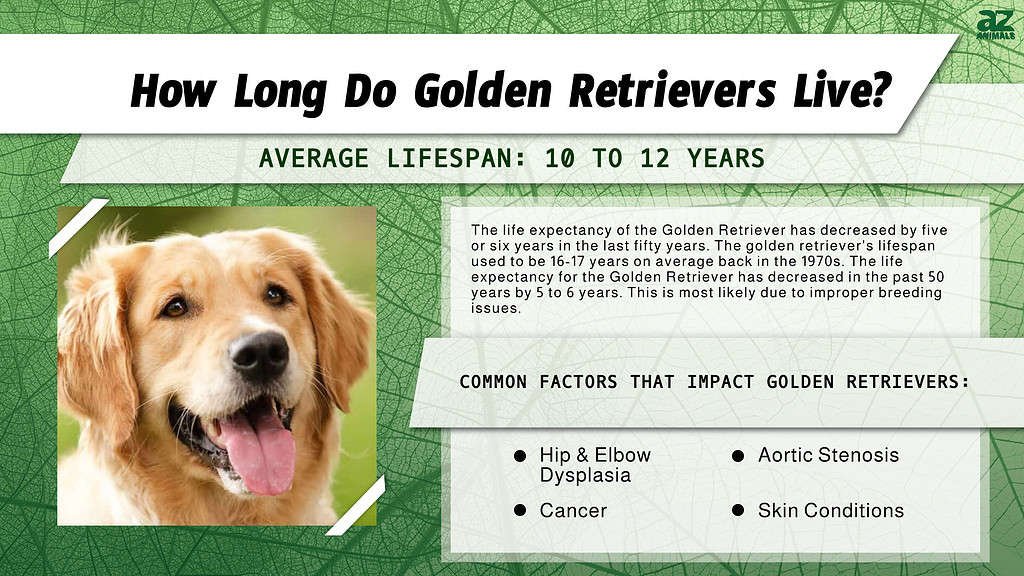Picture this: golden retrievers, those lovable, friendly dogs with their shiny coats and wagging tails. They’ve always been known for their joyful spirit and loyalty as family pets. But have you ever wondered why the lifespan of golden retrievers is decreasing? It’s a perplexing question that has caught the attention of many researchers and dog lovers alike. So, let’s dive in and uncover the reasons behind this concerning trend.
In recent years, there has been growing concern among pet owners and experts about the declining lifespan of golden retrievers. It’s a puzzling phenomenon because, historically, these beautiful creatures were known for their relatively long lives. So, what’s going on? Well, one factor seems to be the rise in genetic disorders within the golden retriever population.
Genetic disorders, unfortunately, are becoming increasingly common in golden retrievers. These disorders can range from hip dysplasia to certain types of cancers. The rise in these health issues is attributed to indiscriminate breeding practices and a lack of genetic diversity. As a result, we are seeing more golden retrievers with shortened lifespans and a higher risk of developing debilitating illnesses.
So, what can be done to address this alarming trend and help our beloved golden retrievers live longer, healthier lives? It starts with responsible breeding practices. By promoting genetic diversity and selecting breeding pairs that are free of hereditary diseases, we can improve the overall health of the golden retriever population. Additionally, early detection and proper medical care for genetic disorders are crucial in managing and preventing further complications. Through these efforts, we can strive to reverse the decreasing lifespan of golden retrievers and ensure that these wonderful companions continue to bring happiness and joy to our lives for many years to come.

Why is Golden Retriever Lifespan Decreasing?
Golden Retrievers are known for their friendly nature, intelligence, and loyalty. They are a popular breed among families and have been cherished for their long lifespans. However, in recent years, there has been a concerning trend of a decreasing lifespan among Golden Retrievers. This article will explore the potential reasons behind this decline and provide insights into how owners can help ensure their Golden Retrievers live longer, healthier lives.
The Role of Genetics in Golden Retriever Lifespan
Genetics play a significant role in the overall lifespan of a Golden Retriever. Over the years, irresponsible breeding practices, such as breeding without proper health screenings and prioritizing aesthetics over health, have contributed to a decline in the breed’s overall genetic health. This has led to an increase in the prevalence of hereditary health conditions that can affect the lifespan of Golden Retrievers.
One such condition is cancer. Golden Retrievers have a higher predisposition to certain types of cancer, including lymphoma and hemangiosarcoma. These cancers can significantly impact the lifespan of a dog, often leading to premature death. Additionally, genetic diseases like hip and elbow dysplasia, which affect the joints, can also decrease the overall quality of life and lifespan of Golden Retrievers.
Irresponsible Breeding Practices
Another factor contributing to the decreasing lifespan of Golden Retrievers is irresponsible breeding practices. Some breeders prioritize aesthetics or popular traits without considering the potential health implications. This can lead to the propagation of genetic diseases and health conditions within the breed. Responsible breeding practices, such as health clearances, genetic testing, and prioritizing overall health and temperament, are crucial in maintaining the breed’s longevity.
Additionally, the demand for Golden Retrievers has led to an increase in puppy mills and unscrupulous breeders who prioritize profit over the well-being of the dogs. Dogs from these sources often come from unhealthy breeding environments, leading to weak immune systems and predisposition to various health issues. By supporting reputable breeders and adopting from shelters or rescues, individuals can play a role in promoting healthier breeding practices and ultimately contribute to improving the breed’s overall lifespan.
Educating and Empowering Owners
As responsible Golden Retriever owners, it is crucial to be well-informed about the breed’s potential health issues and take proactive measures to ensure their furry friends live long, healthy lives. Regular veterinary check-ups, proper nutrition, exercise, and mental stimulation are essential for maintaining a Golden Retriever’s well-being. Additionally, being aware of the early signs of common health conditions can help in catching them early and seeking appropriate medical attention.
Owners should also be mindful of environmental factors affecting their Golden Retrievers’ health and lifespan. These include exposure to second-hand smoke, toxic household substances, excessive heat, and lack of proper exercise. Creating a safe and nurturing environment for Golden Retrievers can significantly contribute to their overall well-being and, in turn, their lifespan.
Reducing Stress and Promoting Mental Well-being
Stress plays a significant role in the overall health and lifespan of any living being, including Golden Retrievers. Chronic stress can weaken the immune system, making dogs more susceptible to various diseases and illnesses. Providing a safe and supportive environment for Golden Retrievers, free from excessive noise, conflicts, and separation anxiety, can help reduce stress levels and promote their mental well-being.
Engaging Golden Retrievers in mentally stimulating activities, such as puzzle toys, obedience training, and interactive play, can also contribute to their overall happiness and longevity. Mental enrichment not only keeps their minds sharp but also helps prevent behavioral issues caused by boredom or anxiety.
Responsible Ownership for Longer Lifespans
As Golden Retriever owners, it is our responsibility to prioritize the health and well-being of our furry friends. By understanding the genetic factors, encouraging responsible breeding practices, and being proactive in promoting their overall health, we can contribute to increasing the lifespan of this beloved breed. Educating ourselves, seeking guidance from reputable veterinarians, and staying actively involved in their care and well-being are crucial steps towards ensuring our Golden Retrievers live long, healthy lives filled with love, joy, and companionship.
Key Takeaways: Why is Golden Retriever Lifespan Decreasing?
- 1. Overbreeding and genetic issues are contributing to a shorter lifespan in Golden Retrievers.
- 2. Environmental factors such as pollution and toxins can negatively impact their health.
- 3. Lack of proper exercise and obesity can lead to various health problems and shorter lifespans.
- 4. Increased prevalence of certain diseases, such as cancer, in the Golden Retriever population.
- 5. Better access to healthcare and improved medical treatments can help extend their lifespans.
Frequently Asked Questions
Here are some common questions related to the decreasing lifespan of Golden Retrievers:
1. What are some possible reasons for the decrease in Golden Retriever lifespan?
There are several factors that could contribute to the decreasing lifespan of Golden Retrievers. One possible reason is the increase in genetic health issues. Over the years, selective breeding for aesthetic traits has led to a higher prevalence of health problems in the breed, including various forms of cancer and heart disease. Additionally, environmental factors such as pollution and exposure to toxins could also be impacting their overall health and lifespan.
Furthermore, changes in their diet and exercise patterns could play a role. Poor nutrition and lack of physical activity could lead to obesity and related health issues, which can shorten a dog’s lifespan. Lastly, advancements in veterinary care have also played a role in identifying and diagnosing underlying health conditions that were previously unknown, which could contribute to a perception of a decrease in lifespan.
2. Can lifestyle and living conditions affect the lifespan of Golden Retrievers?
Absolutely! Golden Retrievers thrive in a healthy and stimulating environment. Dogs that live in loving homes with regular exercise, a balanced diet, and proper veterinary care generally have longer lifespans. On the other hand, dogs that experience neglect, poor living conditions, or lack mental and physical stimulation may be more prone to health issues and a shorter lifespan.
Furthermore, high-stress levels can have a negative impact on a dog’s overall health and longevity. Golden Retrievers are social and friendly dogs that require companionship and interaction. Isolation, lack of socialization, and high-stress environments can contribute to poor mental health, leading to the development of behavioral issues and potential health problems.
3. Are there any preventive measures that can be taken to improve the lifespan of Golden Retrievers?
Absolutely! There are several preventive measures that can help improve the lifespan of Golden Retrievers. First and foremost, responsible breeding practices are crucial. Health and genetic screenings should be conducted to minimize the risk of passing on hereditary health issues. By breeding only healthy dogs with good genetic backgrounds, the occurrence of certain diseases can be reduced.
Additionally, providing a balanced diet with proper nutrition and regular exercise is essential for maintaining a healthy weight and overall wellbeing. Regular visits to the veterinarian for check-ups and vaccinations are important for early detection and prevention of potential health issues. Lastly, creating a loving and stimulating environment, with plenty of socialization and mental stimulation, can contribute to a happy and healthy life for your Golden Retriever.
4. Can advancements in veterinary medicine help improve the lifespan of Golden Retrievers?
Advancements in veterinary medicine have certainly played a significant role in improving the overall health and lifespan of Golden Retrievers. Through better diagnostics, treatment options, and surgical procedures, veterinarians can now identify and address health conditions more effectively than ever before.
For example, early detection methods such as advanced imaging technologies, like MRI and CT scans, allow for the identification of tumors and other health issues in their early stages, increasing the chances of successful treatment. Additionally, advancements in anesthesia and surgical techniques make it possible to perform complex procedures with reduced risks and improved outcomes. Furthermore, ongoing research and development in the field of veterinary medicine continue to uncover new ways to improve the health and lifespan of Golden Retrievers.
5. Is there a difference in lifespan between Golden Retrievers from reputable breeders and those from puppy mills?
There can be a significant difference in lifespan between Golden Retrievers from reputable breeders versus those from puppy mills. Reputable breeders prioritize the health and genetic well-being of their dogs, conducting appropriate health screenings and carefully selecting breeding pairs. This helps to minimize the risk of passing on hereditary health issues and ensures that the puppies are born from healthy parents.
On the other hand, puppy mills prioritize profit over the health and well-being of their dogs. Dogs from these facilities often come from overcrowded, unsanitary conditions with minimal veterinary care. Due to poor breeding practices and lack of proper care, these dogs are more prone to health issues and reduced lifespans. Therefore, it’s highly recommended to obtain a Golden Retriever from a reputable breeder who invests in their dogs’ welfare and promotes healthy breeding practices.

Summary
Golden retrievers’ lifespans are decreasing due to genetic health conditions and lifestyle factors. Inbreeding and genetic disorders are leading causes of shorter lifespans. Overbreeding and lack of genetic diversity increase the risk of diseases and health problems. Environmental factors, such as poor diet and lack of exercise, also play a role. Owners need to prioritize responsible breeding and take steps to ensure their golden retrievers lead healthy lives.
Taking care of a golden retriever involves providing a balanced diet, regular exercise, and routine veterinary check-ups. It is important to maintain their overall health and prevent genetic issues. With proper care and responsible breeding practices, we can strive to improve the lifespan of these beloved dogs and ensure they live long, happy lives.
